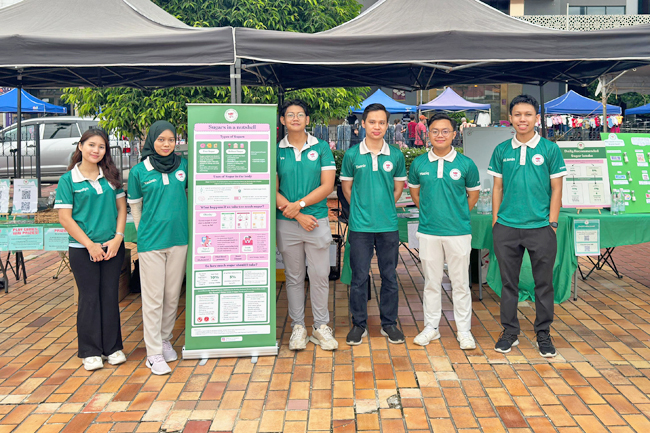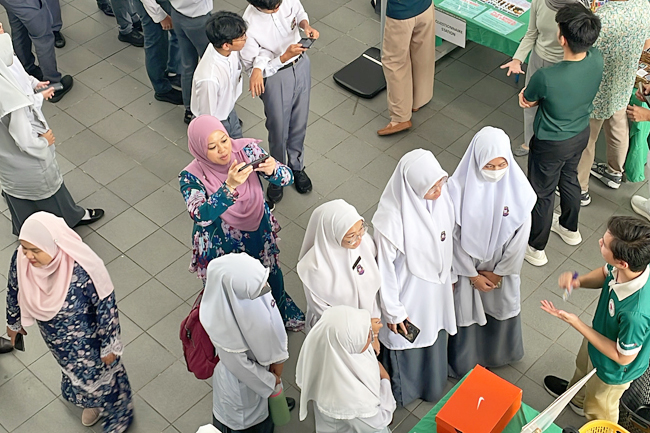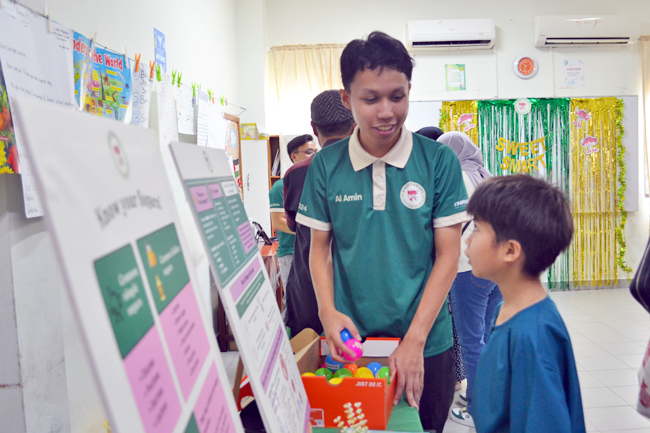The surge in non-communicable diseases (NCDs) like diabetes and heart disease has cast a heavy shadow over global public health systems, Brunei Darussalam included.
As these conditions become increasingly prevalent, particularly among the younger generation, the need for action has never been more pressing.
Stepping up to this challenge, a group of passionate third-year medical students from the Pengiran Anak Puteri Rashidah Sa’adatul Bolkiah Institute of Health Sciences (PAPRSB IHS), Universiti Brunei Darussalam (UBD) have taken a bold stance against one of the major contributors: excessive sugar consumption.
Introducing the SWEET Smart initiative – Sugar Wellness Education and Empowerment for Teenagers – a dedicated team on a mission to educate adolescents on the hidden dangers of too much sugar, while promoting healthier lifestyle choices and dietary habits.
THE VISION BEHIND SWEET SMART
SWEET Smart was born from a clear and pressing concern: the link between excessive sugar consumption and a growing range of health issues, especially among younger generations.
NCDs such as diabetes and heart disease on the rise, the group’s goal is to not only educate but also empower adolescents in Brunei to make healthier dietary choices.




Their mission is simple yet crucial: to raise awareness of the harmful effects of too much sugar and promote long-lasting lifestyle changes that could ripple out into a healthier future for the country.
The group has set three key objectives. First, to assess public knowledge about the impact of sugar on health.
Second, to educate adolescents on the risks of excessive sugar and encourage healthier eating habits.
Finally, they aim to equip young people with the tools to make informed dietary decisions that can help prevent NCDs.
TAKING THE MESSAGE TO SCHOOLS AND COMMUNITIES
SWEET Smart has taken their mission directly to schools and communities, using interactive talks and booths to engage students. They kicked off their outreach at the Tutong Sixth Form Centre on August 26, before visiting St James’ School, Duli Pengiran Muda Al-Muhtadee Billah College (MDPMAMB), and Paduka Seri Begawan Sultan Science College (MSPSBS).
Beyond schools, their educational booths have made appearances at the PAPRSB IHS, UBD, and Bandarku Ceria, ensuring their message reaches a wider audience.
Each educational booth was designed to be both fun and informative. With hands-on activities and games, the team effectively communicated vital health information in a way that appealed to adolescents.
INTERACTIVE BOOTHS FOR LEARNING AND FUN
At these booths, students were introduced to the concept of “free sugar”- sugars added to food and drinks, which can be harmful in large amounts.
Games like throwing balls into baskets labelled “Contains Free Sugar” and “Does Not Contain Free Sugar” made the learning process engaging.
This simple activity helped adolescents become more aware of hidden sugars in everyday foods, encouraging them to think twice before consuming sugar-heavy snacks and drinks.
Other activities, such as ‘Match and Arrange’ had students pair causes and effects of sugar-induced diseases. This helped deepen their understanding of the long-term risks associated with high sugar intake, making it easier to comprehend why cutting down on sugar is so important.
One of the most popular booths featured the World Health Organization’s (WHO) recommendations for daily sugar intake. Using a nerf gun, students aimed at cups representing popular snacks and their sugar content, with the goal of reducing total daily sugar intake to the recommended 50 grammes (g).
This visual and interactive approach made students more conscious of just how much sugar is hidden in their favourite treats.
BRINGING THE LESSONS HOME
SWEET Smart’s initiatives didn’t stop at school gates. They launched a ‘Bring Your Own Water & Fruit to School Day’ at several schools, including Tutong Sixth Form Centre, MDPMAMB and MSPSBS.
This initiative encouraged students to swap sugary drinks and snacks for healthier options, like water and fruit.
Participants shared photos of themselves with their water bottles and fruit on Instagram, with prizes awarded for the most creative posts.
Although a small gesture, this initiative reinforced the idea that making healthy choices is an everyday commitment. It also helped students realise that staying hydrated and choosing nutritious snacks is more than just a lesson – it’s a habit that can lead to long-term health benefits.
SPREADING AWARENESS THROUGH ENGAGING TALKS
In addition to fun activities, SWEET Smart delivered educational talks to provide a more in-depth look at the dangers of excessive sugar consumption. These sessions, lasting around 90 minutes, were designed to be interactive, with quizzes and prize giveaways to keep students engaged throughout.
Before each talk, students completed a short questionnaire to gauge their current knowledge of sugar and its health impacts. The results revealed what misconceptions needed to be addressed, and the talks were tailored accordingly. Key topics included the different types of sugars, how the body processes them, and the recommended daily intake.
The team also shed light on the sugar content of popular snacks and drinks, encouraging healthier alternatives. One particularly impactful segment emphasised the importance of hydration, urging students to prioritise water over sugary beverages.
At the end of each session, students completed another questionnaire to assess how much they had learned. The results showed a significant improvement in their understanding, demonstrating the effectiveness of SWEET Smart’s efforts.
BUILDING A HEALTHIER FUTURE
Through their innovative approach to raising awareness about sugar consumption, SWEET Smart is making waves in Brunei.
By reaching out to students in schools and engaging the broader community, they are fostering a new generation of informed adolescents who are better equipped to make healthier dietary choices.
With initiatives like ‘Bring Your Own Water & Fruit to School Day’ and interactive booths that blend learning with fun, SWEET Smart is proving that promoting health doesn’t have to be dull. Instead, it can be an engaging, community-driven effort that inspires real change – one healthier choice at a time. – Rizal Faisal



















































